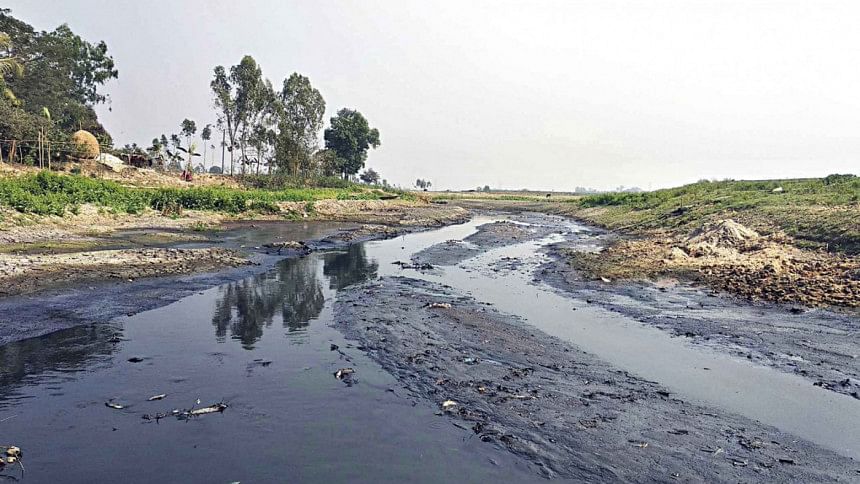Unplanned industrialisation killing the Sutang river

The rivers of Bangladesh are so crucial to its existence that they have been recognised as "living entities" or "legal persons" with their own set of rights by the High Court, and the National River Conservation Commission (NRCC) has been appointed as the legal guardian of all rivers in the country. Despite this, despite the 17-point High Court judgment from July 2019 which clearly stated that "killing a river is virtually a collective suicide for all", and despite the prime minister herself giving several directives to the involved actors to protect rivers—the destruction of our rivers and other waterbodies continues unabated.
And the latest victim is the Sutang river. According to a report in this daily, the Shoiljura canal in Habiganj was re-excavated seven years ago for the crucial task of bringing fresh water from the Sutang to irrigate surrounding villages; but now, it has become a hazard affecting at least 30 villages, as well as the river itself. As is often the case, the culprits are a number of factories established on its banks that are dumping industrial waste into the canal and contaminating the water, to the extent that the Sutang river is now too toxic for aquatic life and for irrigation purposes. On top of that, locals have reported that the polluted water is causing skin diseases and damaging crops, but demands raised by environmentalists and local representatives have, so far, fallen on deaf ears. As the Sutang is connected with the Meghna, this wanton destruction is ultimately affecting one of the major rivers of Bangladesh.
March 14 was the International Day of Action for Rivers, and environmentalists and activists came together to give the government a number of recommendations on saving our rivers, which included dealing with the dumping of waste and making it mandatory for all factories to install waste treatment plants. Will the authorities take these recommendations on board, when they are failing to take even the simplest steps to stop river pollution due to unplanned and unregulated industrialisation?
In almost every report this daily has printed on the destruction of rivers, whether through industrial pollution, land-grabbing or faulty river management, there have been accusations of influential persons escaping any sort of accountability for the actions that are negatively impacting rivers. In this case too, local environmentalists allege that large companies have bought up cheap land and are now occupying and polluting the Sutang river with impunity. Even DoE officials have admitted that despite running effluent treatment plants, it is possible that untreated industrial waste is being discharged into the canal through less visible streams.
Our question is, what are the authorities going to do about it? Are they going to finally step into their role as the protector of our rivers, and take action? Or are they going to allow the unregulated industrialisation around the Sutang to destroy not just the river, but the wetlands and agriculture in surrounding areas, causing untold damage to the environment, as well as to the health and livelihoods of the local population?

 For all latest news, follow The Daily Star's Google News channel.
For all latest news, follow The Daily Star's Google News channel. 



Comments